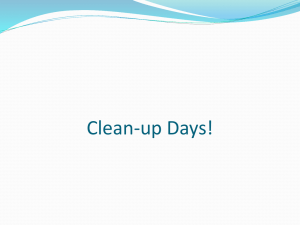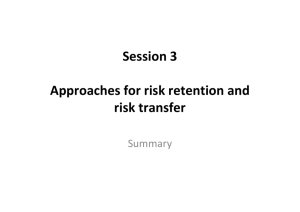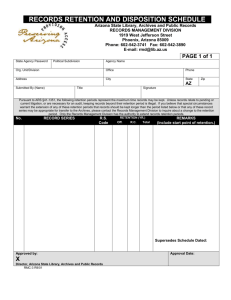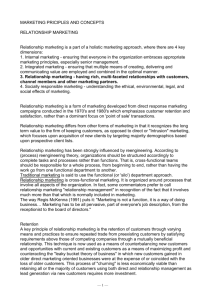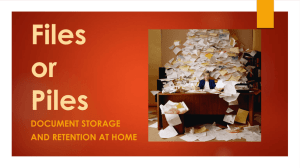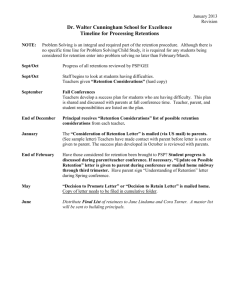Records Management Presentation
advertisement
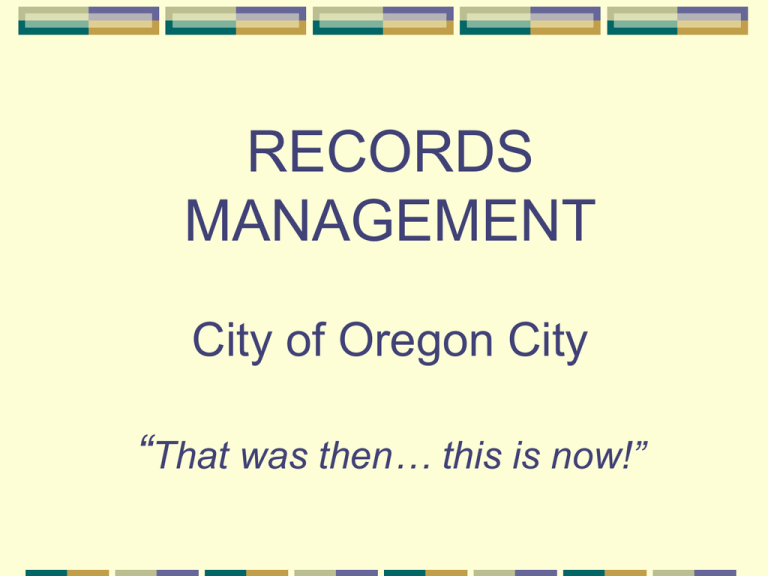
RECORDS MANAGEMENT City of Oregon City “That was then… this is now!” Current Conditions Negative Records stored in container in parking lot; attic at PW; any shelf, closet, cabinet, or corner No central storage Storage areas are not climate controlled Staff not trained Historical records at risk Inadequate staff Positive (Now & future) State’s HP TRIM implemented Retention schedules implemented Bi-annual records destruction procedures implemented Grateful Shred Days held annually Record liaisons assigned from each department Trainings held as needed Acquired off-site, climatecontrolled storage Mission Statement The City Recorder’s Office will preserve, maintain, and provide ready access to public records to the Citizen, the Public Servant, and the City Commission in an efficient, transparent, and timely manner in conformance with all State laws and City policies. 2014-2018 Records Management STRATEGIC PLAN CITY OF OREGON CITY Goal #1: Public records are created, identified, appropriately scheduled, and managed according to retention requirements.. Goal #2: Electronic public records, including digital recordings, electronic mail, digital communications, and social media records, are controlled, preserved, and made accessible according to retention requirements.. Goal #3: Increase transparency of City Government by ensuring that public records are easy to access regardless of where they are or where users are for as long as required by records retention regulations. Goal #4: All public records are preserved in an appropriate environment. Goal #5: Strategically manage, educate, and align staff, technology, and processes to achieve the mission and provide a means to measure the performance. Records Survey - Departments Does your department retain its records series at the stated minimums or beyond the minimums? Answers: Yes; unknown; beyond (This indicates lack of training) Where is the original copy of your record stored? Answers: In our department; file cabinets; city network; storage unit (This indicates inefficient “decentralized” records management.) Name the media types associated with your records? Answers: CDs, photos; electronic copies on servers; data bases; videotapes; mylars; DVDs; cassette tapes; hard copies; microfilm; social media. (This indicates a need for management of many media types.) Have staff members ever received training in records retention? Answers: No. (This indicates where the greatest need lies.) Have staff members ever received training in e-mail policies? Answers: No. (This is a set-up for a legal disaster.) What is a Public Record? "Public record” means any information that: A. Is prepared, owned, used or retained by a state agency or political subdivision; B. Relates to an activity, transaction or function of a state agency or political subdivision; and C. Is necessary to satisfy the fiscal, legal, administrative or historical policies, requirements or needs of the state agency or political subdivision. ORS 192.005(5) (See ORS for complete definition) What is a Public Record? The life cycle of a record: Creation & receipt: Correspondence, forms, reports, etc. Distribution: Internal & external Use: Decision making, documentation, response, reference Maintenance: File, retrieve, transfer Disposition: Inactive storage, archive, destroy Why Records Management? To provide information that is timely, accurate, complete, cost-effective, accessible and useable. Example: A new commissioner wants to compare the City’s comprehensive plan from the ’80s to today’s. Good records management will meet this request efficiently & accurately. Many organizations now consider its information “strategic” in nature. (Past information is needed to develop future strategies.) Why Records Management? To Ensure Regulatory Compliance Comply with laws and regulations that define records management. (ORS Chapter 192) Non-compliance could result in severe fines, penalties or other legal consequences. To Minimize Litigation Risks Reduce the liabilities associated with document disposal by providing for their systematic, routine disposal in the normal course of business and according to Statutemandated regulations. Why Records Management? To Safeguard Essential Information Identify essential records and develop a plan for protection in the event of disaster. To Support Better Management Decision Making By implementing file organization agency-wide, including indexing and retrieval capability, managers can obtain and assemble pertinent information quickly for current decisions and future business planning purposes. Next Steps? Activate the five-year strategic plan for records management, contingent on availability of funds - Minimal costs for offsite records storage and clean-up day - Cost for additional FTE – records manager - Cost for central records storage center in new city hall - Cost for electronic document management upgrades - Cost for computer/printer kiosk for public research Next Steps….. Train staff in essentials of records retention Assign records liaisons in each dept. Implement an annual clean-up day Develop annual plan for maintenance of new policies and procedures Clean-up Day City Manager proposes to close City Hall May 23rd for citywide records clean-up City Recorder trains staff on records management and retention Staff devotes one day to identifying and disposing of records Annual event Comments?
